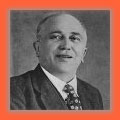|
 The
true name of E. A. Mario was Giovanni Ermete Gaeta,
that he used to sign his early songs. The
true name of E. A. Mario was Giovanni Ermete Gaeta,
that he used to sign his early songs.
At the beginning he wrote above all in Italian;
then, as he felt embittered by some judgements,
he started a series of poems in dialect; he signed
them with the pseudonym E.A. Mario.
This pseudonym corrisponds to his name, the initials
of Alessandro Sacheri (his friend and journalist
from Genua), of the Slavic poetess Maria Clarvy
(who collaborated as E. A. Mario to the Genoa
newspaper "Il lavoro") and of Mario
Rispardi, who was a burning Mazzini supporter,
as E. A. Mario himself was.
So it's explained the pseudonym that for a long
time let people get confused: they thought the
pseudonym belonged to many artists.
E. A. Mario played the mandolin very well and
he worked at the post-office. At work, while he
was at the counter, he met the master Segrè.
It has been told during that meeting the poet
told Segrè he did not use proper lyrics
for his beautiful songs. Out of patience, Segrè
challenged E.A. Mario, asking him for a lyric.
In this way E. A. Mario composed the song "Cara
mammà", which later was published
by Ricordi.
Since then, the volcanic poet and musician started
a long and extraordinary artistic career.
Because of too many absences, he had to leave
the post-office but he was reinstated; then he
was known by everyone. He was already famous in
Naples when in 1918 the song "La leggenda
del Piave" established his name; this song,
that many considered written by an anonymous author,
got the hymn of a nation in war against oppressor.
Many of his songs were successful but his economic
conditions did not get better because the profits
from the copyright was not much; the situation
got worse when his beloved wife Adelina got ill;
she was the daughter of the actress Leonilde Gaglianone
and E.A. Mario married her in 1919 after only
three months of engagement.
After his wife death, only his daughter looked
after him even in straitened circumstances; E.A.
Mario died in his rented house in Viale Elena
in 1961 .
|




 The
true name of E. A. Mario was Giovanni Ermete Gaeta,
that he used to sign his early songs.
The
true name of E. A. Mario was Giovanni Ermete Gaeta,
that he used to sign his early songs.